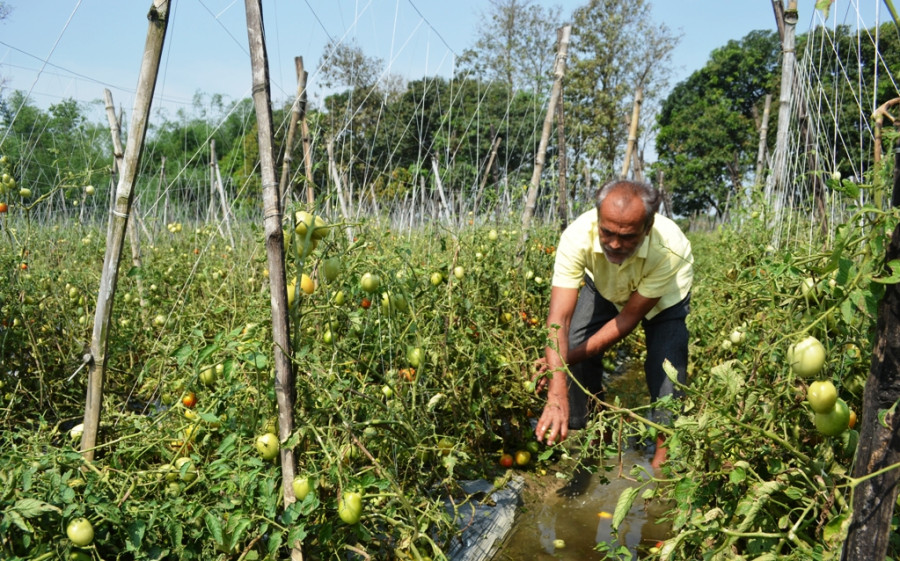Money
While produce rots in Nepal’s fields, food imports continue from India
Produce is piling up in the fields of farmers in Birgunj even as 15-20 trucks laden with vegetables from India cross the border every day.
Bhusan Yadav & Sangam Prasain
On Saturday, Rama Shankar Kushwaha was headed for Birgunj on a bicycle laden with sacks of vegetables when he was stopped by the police. When police personnel asked him why he was violating the lockdown, Kushwaha told them that he was headed for the market as traders had not come by to his fields for three consecutive weeks to collect his produce. The police didn’t buy his argument.
“I was beaten by the police who were patrolling the highway connecting the market and the village,” he said. “I came back home.”
Unable to sell his produce, he is now afraid that they will rot at home.
Nawal Kishore Jha, who is also from Birgunj, believes the same fate will befall the nearly 10 tonnes of tomatoes he’s grown on 2 bighas of land. Ever since the lockdown, he’s had no buyers, as traders can’t come to the villages and farmers themselves can’t go to the market for fear of being beaten by the police.
"With no transportation, I cannot sell my produce. It will soon rot," said Jha.
Despite the bumper harvest this year, many farmers like Kushwaha and Jha fear they will go deeper into debt, as they are unable to sell their produce. Jha alone has a loan of Rs700,000 and another Rs500,000 of his own invested in his fields.
To add insult to injury, Nepali farmers whose produce is piling up have to watch 15-20 trucks laden with vegetables from India crossing the border every day and headed to the market for sale.

For farmers in Birgunj, the current scenario displays a lack of understanding regarding the importance of the local agriculture sector, which has been unable to harvest and sell its produce, even as the country relies on imports to feed its populace.
Birgunj has long been a vital vegetable-producing area for the country, as most farmers here focus more on vegetables than cereal crops. The government has declared Birgunj a ‘vegetable zone’, under the Prime Minister's Agriculture Modernisation Project. The ensuing mechanisation assistance and farming subsidies offered by the government have attracted many farmers to take up commercial agriculture in the region. The zone stretches over 750 bighas, engaging 54 entrepreneurs and 62 farmers’ groups.
Despite assurances from the government regarding the delivery and supply of essentials, farmers have largely been asked to stay home and not go out into the fields or to the market. According to Ram Babu Sah of Bhauratar, farmers are incurring daily losses of around Rs700,000.
On March 29, the Cabinet decided to streamline the distribution of vegetables, fruits, foodstuff, drinking water, milk, and medicines while ensuring physical distancing measures. The federal government had asked provincial governments to coordinate with the local administration to help farmers get their products to the market.
The Ministry of Agriculture and Livestock Development had also issued a notice on April 17 to ensure smooth supply of basic food, vegetables, milk, fruits, fish, eggs and livestock feed.
Those directions, however, do not seem to have been implemented, say farmers.
According to Jha, even though there are three layers of government, none understands the plight of farmers.
“To make the lockdown effective, the police administration had to create public awareness about the spread of Covid-19, but also create an environment for farmers to sell their vegetables in the market,” he said. “Instead of helping us, the police have been beating farmers with sticks.”
District officials, however, deny that police are taking any action against farmers. Lalit Kumar Basnet, information officer at the Parsa District Administration Office, said there was no obstruction in the transportation of vegetables.
"The administration had only stopped the sale of vegetables in the market," said Basnet, who is also the assistant chief district officer.
According to experts, the lockdown could have been an opportunity for Nepal to move away from imports and prioritise its own agricultural output.
Former finance secretary Rameshore Khanal recently told the Post that there is currently no link between villages and the urban markets and vegetables may rot in the field.
Nepal imported agricultural goods worth more than Rs220 billion last fiscal year.

The lockdown was also an opportunity for farmers to sell their produce directly, without any intermediaries like farmer groups and cooperatives, and through e-commerce platforms so that farmers make the most out of their produce and customers receive fresh supplies. But these possibilities have been squandered, say both experts and farmers.
With the breakdown in the supply chain, and an increasing reliance on imports, prices of daily essentials have already begun to rise in the market.
The Food and Agriculture Organization has also warned that the global coronavirus pandemic could trigger a “looming food crisis” if farmers are not taken care of, and supply chains not ensured.
While emphasising that disruptions to food supply are currently “minimal” and that “there is no need for the world to panic,” the FAO said that the global food system is likely to be affected over the next several weeks by Covid-19.
“We risk a looming food crisis unless measures are taken fast to protect the most vulnerable, keep global food supply chains alive and mitigate the pandemic’s impacts across the food system,” the agency said in a statement.
In countries like Nepal, which rely heavily on imports, a food crisis could be closer than imagined. Disruptions in the supply of farming inputs like fertilisers are certain to impact food production.
The breakdown in supply chains and travel restrictions keeping farmers at home could also result in a year of hyperinflation—when prices increase rapidly and go out of control, warn economists.
The lockdown has meant that fewer goods are getting to the market and stocks at grocery stores and small retail shops are depleting. Farmers are not harvesting new crops and even when harvested, they are not reaching the mass market.
There have been calls from various sections, including the political opposition and a loose group of civil society members, to make the lockdown slightly more flexible in order to allow farmers to return to their fields.
"Putting everyone indoors is not a solution. There should be some economic activities to prevent a financial crisis," former finance minister Ram Sharan Mahat had told the Post earlier this week. “As this is the peak time for agricultural activities, urban workers who want to go home can be mobilised in the agriculture sector to ensure production and prevent a food crisis."




 20.9°C Kathmandu
20.9°C Kathmandu















